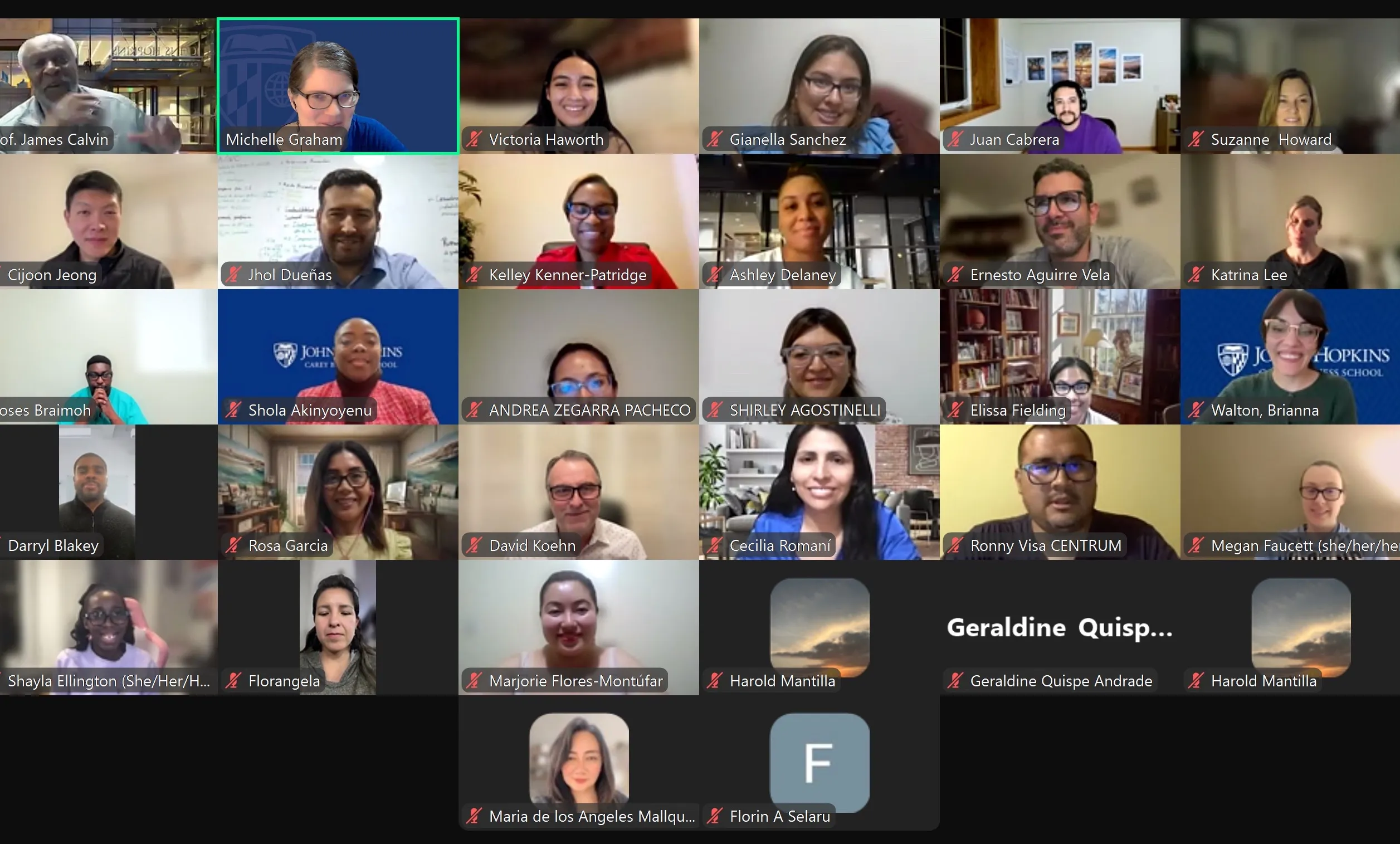Just because you’re earning your degree online, doesn’t mean you have to miss out on the best parts of business school. At Johns Hopkins Carey Business School, experiential learning is embedded into every aspect of our programs. It’s what transforms classroom learning into career-ready skills. And while many experiential learning opportunities are offered in person, we recognize that some of our part-time, online students who want to participate may not always be able to attend. That’s why we’ve created opportunities for part-time, online students to get involved virtually.
From consulting projects to case competitions, virtual speaker events, and interactive workshops, Carey makes sure that online students aren’t just logging in for lectures; they’re collaborating with classmates, solving business challenges, and connecting with leaders across industries.
Carey’s virtual experiential learning opportunities include the Health Care Strategy Consulting Practicum and the virtual Peru Global Immersion. Online students also have the opportunity to participate in in-person experiential learning as well.
Health Care Strategy Consulting Practicum
The Health Care Strategy Consulting Practicum is a fully online course that gives students the chance to step into the role of a consultant and work directly with health care organizations. In the 16-week course, teams analyze their partner organizations business challenges and present strategic recommendations.
“This course is unique in several respects. Students engage in three levels of learning: studying strategic tools applied specifically to health care, building relationships with real-world health care organizations to apply those strategies to business challenges, and using Kolb’s experiential learning framework to intentionally reflect on their learning from both team and client perspectives,” said faculty lead and senior lecturer Bonnie Robeson.
Kolb’s framework describes experiential learning as a four-stage cycle: concrete experience, reflective observation, abstract conceptualization, and active experimentation.
Students learn to ask clients meaningful questions to collect the information they need using Kolb’s framework to structure the process of planning questions as a team, leading client conversations, evaluating interactions, and preparing for future discussions. They also reflect on their teamwork, growth mindset, resilience, and ability to show empathy.
Even in a virtual format, students meet regularly with their faculty advisor and client partners, gaining firsthand experience in consulting while sharpening their problem-solving and communication skills.
“Because this is an online course, students and clients are often located in different geographic areas and time zones, mirroring today’s global business environment,” said Robeson.
Erica Reinhardt (MBA ’24), assistant director of lean sigma deployment at the Johns Hopkins Armstrong Institute for Patient Safety and Quality, participated in the course as both a student and, after graduation, as a project sponsor.
“I chose to return as a project sponsor because of my own positive experiences as a student and the clear value these projects create for both sides. I saw it as a win-win opportunity: we provide meaningful learning experiences for the students, while their fresh, outsider perspectives help our team think differently, uncover new challenges, and identify innovative solutions we might not have seen on our own,” said Reinhardt.
The students apply their learning from previous courses in real time, drawing on skills such as time management, effective communication, and project management. They also integrate knowledge from finance, marketing, analytics, and management and leadership courses. Working in teams, students refine the critical skill of asking the right questions to gather the information needed to move their projects forward.
Virtual Peru Global Immersion
Carey also brings the world to your screen in the virtual Peru Global Immersion course. Students dive into Peru’s economy and business environment, exploring how their culture, politics, and industry intersect.
In this eight-week virtual course, graduate students from Carey work together with students from CENTRUM Pontificia Universidad Católica del Perú (PUCP) in cross-cultural teams on an international business challenge.
At the start the course, students are introduced to their teammates and learn about the business challenges they will tackle together. In preparation for their collaboration, the students are guided through effective multicultural team-building principles to create a team contract and develop their project work plan.
“It was wonderful to work with individuals from different backgrounds who brought unique thought processes and perspectives to the group,” said Brianna Walton (MBA ’25). “I found that our differences didn’t just complement each other, they pushed me to think in new ways and consider angles I wouldn’t have on my own. It reminded me how valuable cross-cultural teamwork is, not only for solving problems creatively but also for building genuine understanding and connection.”
Over the following weeks, students explore the differences between their respective countries’ business environments and share their own perspectives about the project topic. Lectures are delivered by faculty from each academic institution. Weekly synchronous class sessions include virtual business site visits, workshops, expert panels, and cultural enrichment activities to complement the intensive team project work.
“I learned how important it is to be adaptable and open to different perspectives when working with people from diverse backgrounds. The value of having a shared vision and clear end goal—when everyone understands what we’re working toward and the role they play in it—it not only makes the team more effective, but it also creates a stronger sense of connection and purpose,” said Walton.
Part-time, online programs at Carey
At Carey, being an online student doesn’t mean doing it alone. It means being part of a global community of problem-solvers, innovators, and leaders. You collaborate on real-world projects, learn from faculty and industry experts, and engage in virtual experiential opportunities that bring the classroom to life far beyond the screen. And you’re all connected through the same shared experiences that prepare you for the business challenges of tomorrow.
